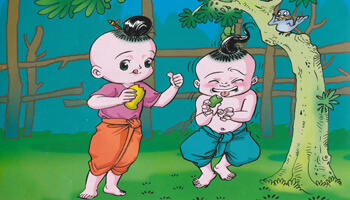Teacher Pear and I met up in a cafe in Bangkok for an afternoon sweet treat. We were talking about how much we loved eating dessert and it let us to an old saying “กินคาวไม่กินหวานสันดานไพร่ gin kaao mâi gin wăan săn-daan prâi/”. People in this generation like to jokingly use it as an excuse to eat more sugar. We found this expression interesting and would like to share with you.
First, let’s have a look at the meaning of the new words;
คาว /kaao/ comes from the full term ‘อาหารคาว /aa-hăan kaao/’ which means ‘meat dish’.
หวาน /wăan/ means ‘sweet’. In this expression it means ‘dessert’.
สันดาน /săn-daan/ means trait or character, but this term is not polite. It is usually used in a negative comment.
ไพร่ /prâi/ means ‘servants or lower-class people’ in the old times.
So the entire expression กินคาวไม่กินหวานสันดานไพร่ /gin kaao mâi gin wăan săn-daan prâi/ is the phrase used in the old eras by people in upper social class to look down upon lower-class people that ‘after eating main dish and not having dessert is the character of people from a low social class’. As in the old days sugar was a luxury item and hard to find. Only wealthy people could afford to have it in the kitchen thus poor people didn’t have a chance to eat dessert.
This is not the case in the present time anymore but the expression is still used but in a different manner – it is used to say for fun among friends as a reason to eat dessert even after our stomach is so stuffed! Similar to English expression ‘there is always room for dessert’. 🙂
Since we are in the topic of ‘sweets’ , we would like to talk about a few more interesting Thai idioms that consist of the word หวาน wăan (sweet).
1. ปากหวาน /bpàak wăan/
ปาก /bpàak/ means ‘mouth’. This phrase is used to describe someone who is ‘a sweet talker’.
2. ปากหวานก้นเปรี้ยว /bpàak wăan gôn bprîao/ = He has honey in the mouth and a razor at the girdle.
ก้น /gôn/ = bottom, buttocks
เปรี้ยว /bprîao/ = sour
This expression literally means ‘sweet mouth, sour bottom’. It is used to describe someone who always say sweet things to others but he or she is not sincere. English expression would be ‘He has honey in the mouth and a razor at the girdle.’
3. หวานเป็นลม ขมเป็นยา /wăan bpen lom, kŏm bpen yaa/
ลม /lom/ = wind
ขม /kŏm/ = bitter
ยา /yaa/ = medicine
This Thai idiom comes from Chinese proverb which means ‘bitter pills may have blessed effects’ or ‘A good medicine tastes bitter’. The Thai saying means sweet words are often please ourselves but they are meaningless, while criticism could be useful and bring us to senses.
4. อดเปรี้ยวไว้กินหวาน /òt bprîao wái gin wăan/
อด /òt/ = to refrain , abstain
This expression literally means ‘Forego the sour for the sweet’. The actual meaning of the idiom is to encourage people to be patient so they can enjoy better things in the future.
English expression would be ‘He that eats the hard shall eat the ripe’ or ‘It is better to have a hen tomorrow than an egg today’.
5. ยามรักน้ำต้มผักก็ว่าหวาน /yaam rák náam dtôm pàk gâw wâa wăan/ ยามชังน้ำตาลก็ว่าขม /yaam chang náam-dtaan gâw wâa kŏm/
ยาม /yaam/ in this context is the conjunction ‘when’. It is the old term.
รัก /rák/ = love
น้ำ /náam/ = water
ต้ม /dtôm/ = to boil
ผัก /pàk/ = vegetable
น้ำต้มผัก /náam dtôm pàk/ = vegetable broth
ว่า /wâa/ in this saying come from the full phrase ‘พูดว่า /pûud wâa/ which means ‘say that…’
ชัง /chang/ = hate (old formal term)
น้ำตาล /náam dtaan/ = sugar
ขม /kŏm / = bitter
This proverb literally means ‘when people love each other even vegetable broth which is usually tasteless can taste sweet to them, but when they hate each other even the sugar doesn’t taste sweet anymore. It means when people love each other they can overlook the bad habit in the other person, everything is nice and good. But when love fades they only see the negative side in the other person.



Hi, Mod!
I have something to add to your “sweet” idioms:
1) หวานลิ้นกินตาย – literally means “if you’ll eat only sweet words you’ll die”.
“Fine words butter no parsnips.” – Parsnips are traditionally garnished with butter before serving.
“Words are not as good as deeds.”
This idiom means that it is easy to talk, but talk is not action; nothing is ever achieved by fine words alone, by empty promises or flattery.
2) องุ่นเปรี้ยว มะนาวหวาน – literally means “the grapes are sour, the lemons are sweet.”
“The grapes are sour (sour grapes).”
This idiom means that someone can not have (get) the desired thing though it is near at hand or may seem so.
3) น้ำตาลใกล้มด ใครจะอดไหว / น้ำตาลใกล้มด ใครจะอดได้ – literally means “sugar close to ant, who can stand that?”
“Proximity causes love”. – If man and woman are naturally close together (live nearby, work together…) they have a chance to love each other more than if they are apart.
For example related expression (น้ำตาลใกล้มด ใครอดงดได้) we can hear in thai song ”น้ำตาลใกล้มด”.
Wow! thank you for sharing the interesting expressions. You can be a Thai teacher. 🙂
Hi Mod
I have just started learning Thai by watching your videos. It is easy to learn from you as you can teach very well. Good job!
Sawatdii ka Rojo, thank you for your comment. I am happy to hear that you found my videos useful in your Thai learning. Keep practicing. 🙂
kop khun kha for the blog hehehe :D:D
Yin-dii ka (my pleasure). 😀
I really like getting insight into Thai culture. And the Idioms and Proverbs makes learning Thai fun.
That is really nice. We are happy to hear your comment. 🙂